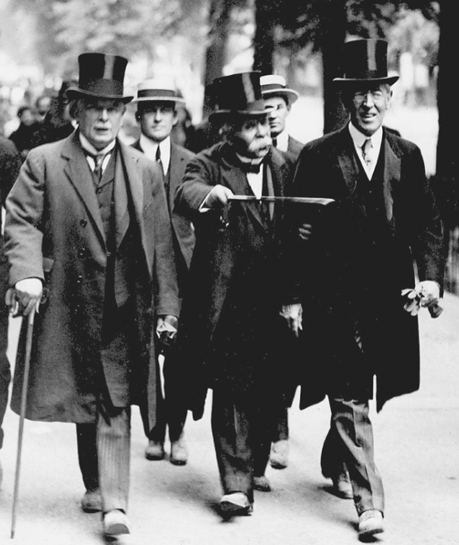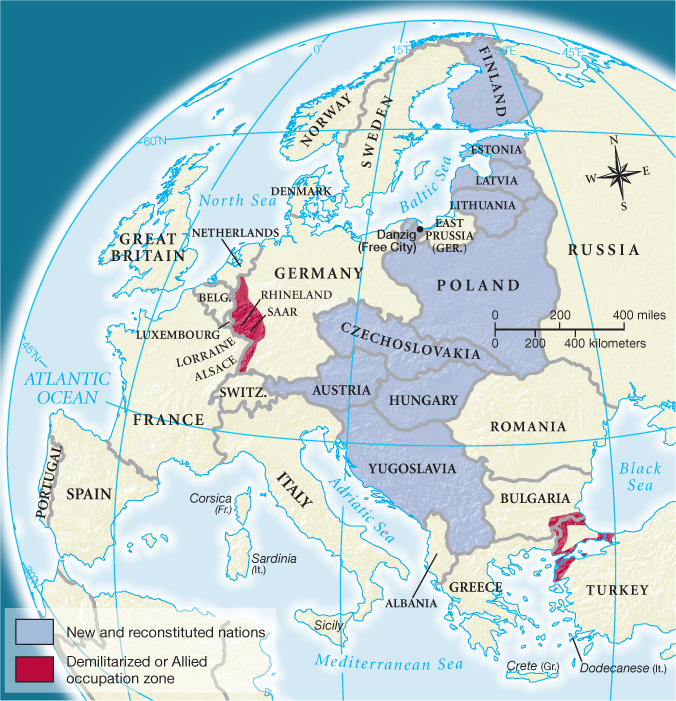The Paris Peace Conference.
Printed Page 607 Chapter Chronology
The Paris Peace Conference. From January 18 to June 28, 1919, the eyes of the world focused on Paris. Wilson, inspired by his mission, decided to head the U.S. delegation. He said he owed it to the American soldiers. "It is now my duty," he announced, "to play my full part in making good what they gave their life's blood to obtain." A dubious British diplomat retorted that Wilson was drawn to Paris "as a debutante is entranced by the prospect of her first ball." The decision to leave the country at a time when his political opponents challenged his leadership was risky enough, but his stubborn refusal to include prominent Republicans in the delegation proved foolhardy and eventually cost him his dream of a new world order.
After four terrible years of war, the common people of Europe almost worshipped Wilson, believing that he would create a safer, more decent world. When the peace conference convened at Louis XIV's magnificent palace at Versailles, however, Wilson encountered a different reception. To the Allied leaders, Wilson appeared a naive and impractical moralist. His desire to gather former enemies within a new international democratic order showed how little he understood hard European realities. Georges Clemenceau, premier of France, claimed that Wilson "believed you could do everything by formulas" and "empty theory." Disparaging the Fourteen Points, he added, "God himself was content with ten commandments."

The Allies wanted to fasten blame for the war on Germany, totally disarm it, and make it pay so dearly that it would never threaten its neighbors again. The French demanded retribution in the form of territory containing Germany's richest mineral resources. The British made it clear that they were not about to give up the powerful weapon of naval blockade for the vague principle of freedom of the seas.
The Allies forced Wilson to make drastic compromises. In return for France's moderating its territorial claims, he agreed to support Article 231 of the peace treaty, assigning war guilt to Germany. Though saved from permanently losing Rhineland territory to the French, Germany was outraged at being singled out as the instigator of the war and being saddled with more than $33 billion in damages. Many Germans felt that their nation had been betrayed. After agreeing to an armistice in the belief that peace terms would be based in Wilson's generous Fourteen Points, they faced hardship and humiliation instead.
Wilson had better success in establishing the principle of self-determination. But from the beginning, Secretary of State Robert Lansing knew that the president's concept of self-determination was "simply loaded with dynamite." Lansing wondered, "What unit has he in mind? Does he mean a race, a territorial area, or a community?" Even Wilson was vague about what self-determination actually meant. "When I gave utterance to those words," he admitted, "I said them without the knowledge that nationalities existed, which are coming to us day after day." Lansing suspected that the notion "will raise hopes which can never be realized. It will, I fear, cost thousands of lives. In the end it is bound to be discredited, to be called the dream of an idealist who failed to realize the danger until it was too late."

Yet partly on the basis of self-determination, the conference redrew the map of Europe and parts of the rest of the world. Portions of Austria-Hungary were ceded to Italy, Poland, and Romania, and the remainder was reassembled into Austria, Hungary, Czechoslovakia, and Yugoslavia — independent republics whose boundaries were drawn with attention to concentrations of major ethnic groups. More arbitrarily, the Ottoman empire was carved up into small mandates (including Palestine) run by local leaders but under the control of France and Great Britain. The conference reserved the mandate system for those regions it deemed insufficiently "civilized" to have full independence. Thus, the reconstructed nations — each beset with ethnic and nationalist rivalries — faced the challenge of making a new democratic government work (Map 22.5). Many of today's bitterest disputes — in the Balkans and Iraq, between Greece and Turkey, between Arabs and Jews — have roots in the decisions made in Paris in 1919.
Wilson hoped that self-determination would also dictate the fate of Germany's colonies in Asia and Africa. But the Allies, who had taken over the colonies during the war, allowed the League of Nations only a mandate to administer them. Technically, the mandate system rejected imperialism, but in reality it allowed the Allies to maintain control. Thus, while denying Germany its colonies, the Allies retained and added to their own empires.
The cause of democratic equality suffered another setback when the peace conference rejected Japan's call for a statement of racial equality in the treaty. Wilson's belief in the superiority of whites, as well as his apprehension about how white Americans would respond to such a declaration, led him to oppose the clause. To soothe hurt feelings, Wilson agreed to grant Japan a mandate over the Shantung Peninsula in northern China, which had formerly been controlled by Germany. The gesture mollified Japan's moderate leaders, but the military faction preparing to take over the country used bitterness toward racist Western colonialism to build support for expanding Japanese power throughout Asia.
Closest to Wilson's heart was finding a new way to manage international relations. In Wilson's view, war had discredited the old strategy of balance of power. Instead, he proposed a League of Nations that would provide collective security. The league would establish rules of international conduct and resolve conflicts between nations through rational and peaceful means. When the Allies agreed to the league, Wilson was overjoyed. He believed that the league would rectify the errors his colleagues had forced on him in Paris.
To some Europeans and Americans, the Versailles treaty came as a bitter disappointment. Wilson's admirers were shocked that the president dealt in compromise like any other politician. But without Wilson's presence, the treaty that was signed on June 28, 1919, surely would have been more vindictive. Wilson returned home in July 1919 consoled that, despite his frustrations, he had gained what he most wanted — a League of Nations. In Wilson's judgment, "We have completed in the least time possible the greatest work that four men have ever done."
Versailles treaty
Treaty signed on June 28, 1919, that ended World War I. The agreement redrew the map of the world and assigned Germany sole responsibility for the war and saddled it with a debt of $33 billion in war damages. Many Germans felt betrayed by the treaty.